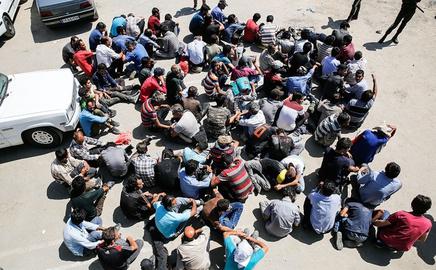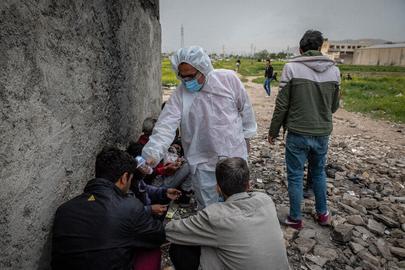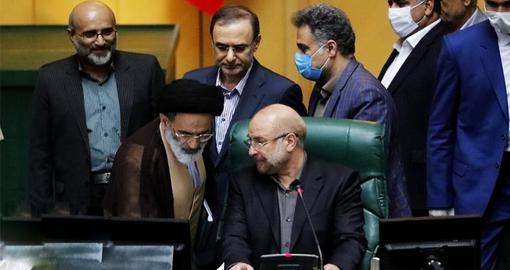The following article was written by a citizen journalist based in Iran who does not want to use his name for security reasons.
"When he saw the bread in my hand, he reached out, grabbed it and ran off. My heart still pounds when I remember it."
These are the words of Sedigheh, a woman of about 50. She lives near Harandi Park in the Molavi neighborhood of Tehran. Since the coronavirus outbreak, she has seen large numbers of drug addicts wandering the area's alleys and sleeping on its streets. "Although they say that drug addicts and rough sleepers have been gathered up, they are still there in the neighborhood and disturbing the residents," she said. “If I am not mistaken, it was on the last day of Ramadan or a day before that they grabbed my bread. It was not worth much but I was scared, especially in these days when this deadly disease is not over and we are still seeing these addicts. We are still in trouble. It has not been reduced, it is getting bigger every day and their conditions are getting worse."
The coronavirus outbreak has led to the closure of government-run centers to treat addicts, and many of them have returned to the Shush and Harandi areas of the capital, which were once areas frequented by addicts and homeless people.
The facilities, called Article 16 centers after a section of the country’s Anti-Narcotics Law, operate as addiction treatment camps for drug addicts, who can be sent there on a mandatory basis. Article 16 of the Anti-Narcotics Law states: "Drug addicts and people who use psychotropic substances will be kept in governmental and authorized medical centers for one to three months by order of a judicial official, and their stay can be extended according to the judicial authority's verdicts." The deputy secretary general of the Anti-Narcotics Headquarters, Commander Ali Moayedizadeh, has stated that many homeless people are drug addicts, or else drug addicts become homeless after being “abandoned by their families and left on the street.”
"At first they said that coronavirus had become widespread and the camps were closed and they were all released on to the streets," Sedigheh said. "Drug addicts who do not have a place to stay came back to Harandi Park, it has become their hangout. They spread out a bit of cardboard and do drugs right in front of women and children; they sell and buy drugs and sleep and do everything there."
Ali Agha, another resident of the Harandi neighborhood, shared Sedigheh’s concerns. "Believe me, we're stunned," he said. "We pick up a lot of syringes from the streets. We walk in the park, and we see people taking drugs and injecting, or see the body of an unidentified person." He agreed that the outbreak of coronavirus and the closure of addiction treatment centers have made the situation worse in the neighborhood: "One of these addicts slept right in front of our house last week. My daughter needed to go to work and she was scared. We called everywhere but did not get an answer. The free camps either didn't answer the phone, or they said their capacity was full, or said they had run out of coronavirus test kits and they could not take in any more people without them being tested.”
Turned Away for Having Coronavirus
Anoushirvan Mohseni Bandpey, the governor of Tehran, announced on May 4 that, according to the National Headquarters for Combating Coronavirus, only drug addicts who have tested negative for the virus will be admitted to Article 16 centers. "They did not explain what they will do with people whose tests are positive," Ali Agha said. "Do they have a quarantine ward, or do they go back to the streets?"
After several unsuccessful calls to see if someone could remove the addict who was sleeping in front of his house, Ali Agha finally found a place that had a vacancy, but it was not free of cost. "The person who spoke to me said that if the addict is self-referred, he will only pay one million tomans [$16] for a 20-day period of rehabilitation. But if they have to come and collect the person, there will be a 300,000 tomans ambulance fee added to the costs." So the addict outside Ali Agha’s house stayed there.
In April, Iranians were shocked by media reports that some addicts had created shelters by digging tunnels in old aqueducts or in abandoned pits behind buildings near Shush Park. ”They say the process of picking up addicts has begun, but it’s slow. They came out into the city all at once because of the coronavirus outbreak, and that has led to their underground life,” Ali Agha said.
An employee at the Hor Cultural Center, an educational institute focusing on cinema, theater and music, said the return of drug addicts had caused problems for their work. "A few years ago, when it was a hangout for addicts, many families did not allow their children to attend classes at the center. Now because of the coronavirus outbreak, the rehabilitation centers are closed and addicts have returned to their former hangouts. It’s gone back to how it was and I'm worried that after we reopen, parents won’t let their children come again.”
He said he had heard the addiction centers were open again and operating in line with coronavirus headquarters' protocol, but that he was still seeing addicts on the streets. “Honestly, before the closure of the camps, we did not see any addicts on the street at all, but after the closure, the number of people has increased dramatically. Now the situation is getting better, but these people are still scattered throughout the city."
According to the governor of Tehran, the process of getting drug addicts off the street began on April 27, adding that authorities were picking up 100 addicts a day from the streets of the city. Yet people living and working in Shush, Molavi, and Harandi say there are still many drug addicts, people using drugs and rough sleepers on the streets of their neigborhoods. "Believe me, we're afraid to go out of the house," Sedigheh said. "Some of them just fall down right in front of our house. When we open the door, we don't know whether the person is dead or alive."
visit the accountability section
In this section of Iran Wire, you can contact the officials and launch your campaign for various problems


























comments